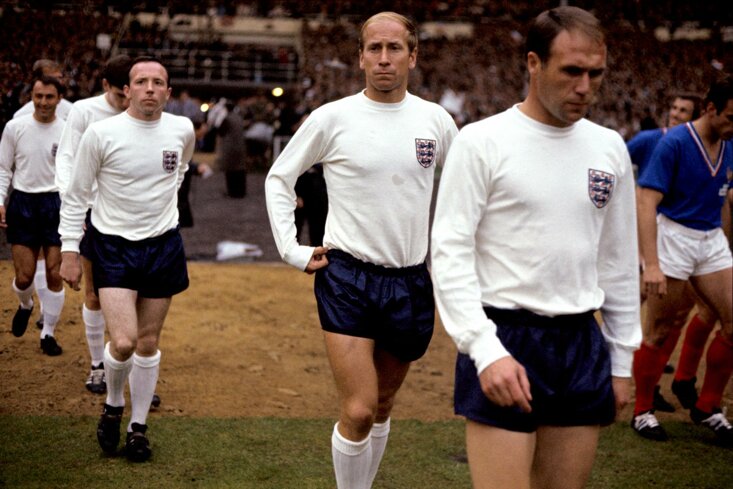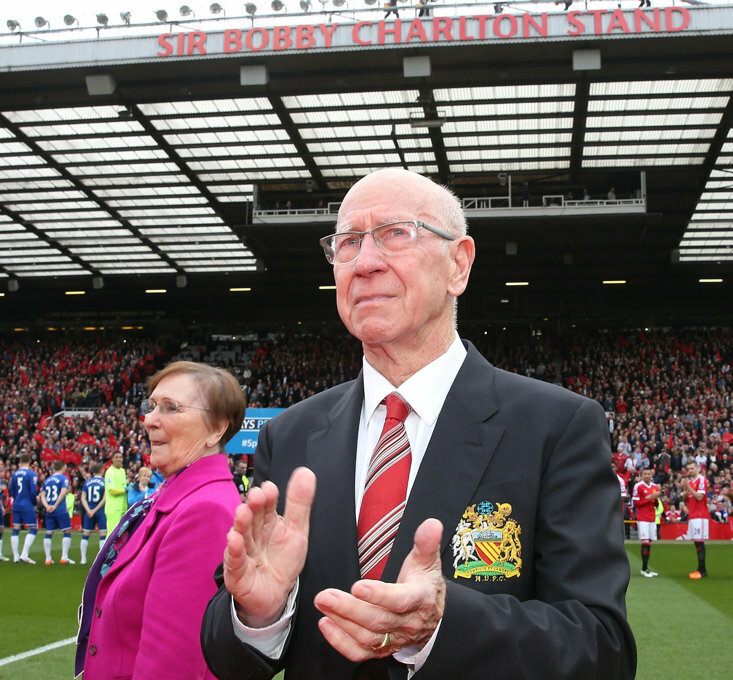Bobby Charlton felt omnipresent. He was in every part of footballing life. Key to every story there was to tell. The greatest of goal scorers but also a scorer of the greatest goals, he was a legend, a sage, a thinker, an example. When he played, everybody was in thrall. When he talked, everybody listened.
His career arc is well known. From the Busby Babes and Munich, to World Cup glory and European triumph. He overcame the sort of tragedy few in the sport have ever known to become arguably his country’s greatest ever player. Even in recent years when he stepped away from media opportunities amid his deteriorating health, he was still an everyday presence in name if not in body.
It cannot be overstated how much English football will miss Sir Bobby Charlton, whose death at the age of 86 was announced on Saturday 21st October.
Brought up in the north-east mining town of Ashington, Bobby showed the aptitude to supplement ability with hard work from an early age. His elder brother Jack, who would become a world champion alongside Bobby in 1966, once told the BBC: “When we were kids we used to go to the park and play. I would go home for dinner but he would stay on there all day. Bobby Charlton is the greatest player I’ve ever seen.”
He signed schoolboy forms with Manchester United at the age of 15 in 1953 and would share with them 20 of the most pivotal years in the club’s history. Bobby was on the flight that killed eight of his team-mates in Munich in 1958 after two aborted take-offs. Dragged from the wreckage by goalkeeper Harry Gregg, Charlton spent a week in hospital suffering from head wounds and severe shock. Even in later years, he talked like a man who had never managed to come to terms with what happened that night.

But somehow overcame that trauma to have the most incredible career. With United he would reach the pinnacle at Wembley in 1968 when they beat Benfica to win the European Cup. He scored twice in the 4-1 win, cementing his place in club folklore on the same turf on which he and brother Jack had made history in the World Cup final with England two years earlier.
Alongside George Best and Denis Law he formed a front line so dominant they were nicknamed the ‘United Trinity’ and in 2008 a statue was built outside Old Trafford bearing the trio’s likenesses. Even when grouped with two incredible players such as those, he somehow stood out.
“Bobby Charlton stood alongside Pele as the greatest players of their generation,” the great Franz Beckenbauer once said of him, and he had others of that era foaming at the mouth too. Portuguese giant Eusebio remarked: “I have many more good than bad memories from my career, but some of the bad memories came from when I crossed paths with Bobby Charlton.”
After leaving United as the top scorer in both his club’s and his national team’s history, Bobby flirted with a managerial career but a two-year spell in charge of Preston North End was not a success and he took to combining TV punditry with the formation of a number of soccer schools across the world. One of them helped a young David Beckham to find the inspiration to become a United and England legend.

“I owed everything to Sir Bobby because, if not for him, maybe I wouldn’t have had the chance of living my dream of playing for the club that I’d supported for so many years and the club my dad supported,” Beckham would say of the experience.
In 1984 he joined the board of directors at Old Trafford and was part of the panel which plumped for Aberdeen boss Alex Ferguson to replace Ron Atkinson as United manager in 1986. He and Ferguson became great friends as well as important figures in the success of an ever greater Red Devils team than the one in which Charlton had featured as a player.
His influence – as a player, as a director, as a person – is everywhere. The 249 goals he scored for Manchester United and 49 for England might have been bettered in recent years by Wayne Rooney, but his place in the annals of both is unshakeable. He has the main stand at Old Trafford named the ‘Sir Bobby Charlton Stand’ in his honour, he was made a knight by the late Queen Elizabeth II in 1994 and was awarded a Lifetime Achievement Award by the BBC at the Sports Personality of the Year ceremony in 2008.
“There has never been a more popular footballer. He was as near to perfection as a man and player as it is possible to be,” his former United boss Matt Busby said of him, and it’s hard to find anybody who has anything other than a wonderful experience with Sir Bobby.
The last surviving member of the Busby Babes and survived only by Sir Geoff Hurst among those who played in the 1966 World Cup final, Charlton’s passing feels like the end of one of English football’s most important eras.
As his former England teammate Jimmy Greaves once said of him: “This is a man who survived the Munich air disaster in 1958, won the World Cup in 1966, the European Cup in 1968 and played a key role in the appointment of Alex Ferguson as Old Trafford manager in 1986. He’s history in the flesh, is Bobby Charlton.”